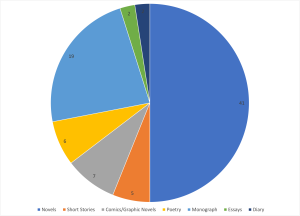This post is more than a bit overdue, and some of these links have been sitting in my text editor ready to go for quite a while now. I’ll start with some music to listen to while you read:
Song/Video: “Castrati Stack” by Tim Hecker
Tim Hecker’s new album, Love Streams, has been out for a little while now, and I think I’ve listened to it through a couple of dozen times. He’s moved away from the maximalism for which he is best known, and begun to incorporate human voices (though not in the form of traditional lyrics and vocals, as you hear in this track), and I like the result. I enjoyed his previous album but thought it was less compelling and a bit chaotic compared to some of his older work; this one brings in some interesting changes while still sounding very much like a Tim Hecker record.
Article: “How an Internet Mapping Glitch Turned a Random Kansas Farm into Digital Hell”
So here’s a nightmare it probably never occurred to you to have. IP (Internet Protocol) addresses identity individual devices connected to the internet; they are like a computer’s phone number. IP mapping services allow interested parties to pinpoint the location of a device with a particular IP address— or try to. Sometimes (fairly often) it isn’t possible to be very precise in this; you can always figure out what country a device with a particular address is in, but sometimes that’s as close as you can get. When that’s the case, companies that offer mapping services will point to a location more or less in the middle of the area to which the device has been tracked— the city, the county, the state, or even the country. In the case of the United States, a company called MaxMind chose a random set of map coordinates more or less (but not exactly) in the center of the country, in rural Kansas. Those coordinates just happen to be the location of a small farm. So, there are a whole bunch of IP addresses— 600 million of them— that, if you try to map them, will lead you to this particular farm. The devices actually assigned those addresses might be in new England, or Florida, or Alaska, but they all point to the same, randomly chosen location in rural Kansas.
One side effect of this is that a lot of people have called or gone to the farm looking for something or someone that isn’t there. That’s annoying. Adding to the problem, though, is the fact that sometimes the reason that an IP address can’t be more precisely located is because the person using it doesn’t want to be located, because they are doing something they shouldn’t be. So, the residents of the Kansas farm have also been
accused of being identity thieves, spammers, scammers and fraudsters. They’ve gotten visited by FBI agents, federal marshals, IRS collectors, ambulances searching for suicidal veterans, and police officers searching for runaway children. They’ve found people scrounging around in their barn. The renters have been doxxed, their names and addresses posted on the internet by vigilantes. Once, someone left a broken toilet in the driveway as a strange, indefinite threat.
Supposedly, the company is updating its database so that addresses that can’t be mapped more precisely will point to a different, more or less central point— hopefully one where nobody lives. But, as they note, not every company that uses their data will update right away, so it could be months before all searches stop sending people to this farm. Maybe more worrying, though, is the fact that
Amateur sleuths who spotted IP addresses used by visitors to their websites or on message forums were so convinced that the Taylor house was the source of their various problems that they created reports about it on Facebook, YouTube, Reddit, the Ripoff Report and Google Plus. (Even today, if you Google the house’s address, it returns a series of websites detailing nefarious activities.)
That is a problem of a different order of magnitude, because the internet never forgets. Those postings are going to persist for years, and continue to come up in searches for any number of IP addresses— God knows Reddit isn’t going to do anything about it. It will be a long time before this farm gets its name cleared entirely.
Article: “The Tragic History of RC Cola” by Jeff Wells
I have to admit to having exactly the attitude that this piece takes as its premise: Who drinks RC Cola? How does it still exist? This isn’t disrespect for a smaller brand; I just don’t think it tastes as good. I think of RC as a kind of budget drink for small restaurants, although I doubt it’s actually significantly cheaper than Coke or Pepsi. Anyway, the point Wells is making is that, for many years in the 1940s and 50s, RC was genuinely in the running, and for a brief moment even had a significant advantage over the big two in being the first major brand to market a low-calorie version of its product. That moment ended when health concerns over the sweetener cyclamate— concerns which now look to be mostly unfounded— destroyed the market for diet soda for many years, pushing RC back firmly into a distant third place; poor management and legal issues helped keep it there. I’m not going to start drinking it (at least, not on purpose— apparently Chicago is the main bastion of RC loyalty outside the south), but this did make me think about it a little more sympathetically.
Article: “The Battle over the Sea Monkey Fortune” by Jack Hitt
The legal battle that serves as the seed for this piece is, if not exactly simple, at least unsurprising: the widow of the inventor (if that is the right word) of the Sea Monkeys is fighting with a toy company who had contracted with her to sell them and now claims ownership of the intellectual property, and continues to sell Amazing Live Sea Monkeys despite her opposition and cancellation of their contract. The actual deal involved is a bit more complicated, which is why there is room for a dispute, but the only surprising thing so far is that there’s still real money involved in the sale of Sea Monkeys— $3.6 million in revenue in 2006.
More unexpected for me was the fact that Sea Monkeys may in fact involve some actual intellectual property, beyond the name itself and the iconic images from the advertisements. The creator of the Amazing Live Sea Monkeys, Harold von Braunhut, was, as one might expect, a bit of a huckster; he also sold X-Ray Specks and any number of other dubious novelty toys. But, in the case of Sea Monkeys, he actually worked with marine biologists to develop a hybrid variety of brine shrimp with a longer incubation period, able to make it through the mail and reach customers with a decent chance at reviving in large numbers. Sea Monkeys sold in major stores today some from China and are a different species, which may or may not be equivalent on those terms; the formula for the real deal is still owned by von Braunhut’s widow, and she no longer allows Big-Time Toys, the company who had the distribution contract, to use it.
Add to all that the fact that von Braunhut was apparently a Jewish Neo-Nazi who added the “von” to his name to make it sound more Germanic, and that his widow starred in a number of not-quite-pornographic exploitation films in the 1960s — including Venus in Furs, based on a novel by Leopold von Sacher-Masoch, whose name is the source of the word “masochism”— and it adds up to something quite unexpected.
Article: “Should Prostitution Be a Crime?” by Emily Bazelon
Obviously, this is a controversial topic, about which people have strong feelings, and I have to respect anyone willing to wade into it in such prominent way. Mostly, though, what I like about this piece is Bazelon’s focus on the debate within feminism between “abolitionists” (who want to eradicate prostitution entirely) and “sex-positive” feminists (who see it as a potentially feminist act, or at least one that shouldn’t be stigmatized and punished as it is). I think there’s a bit of blending together the more pragmatic “make it legal so we can make it safer” argument with the more positive claim that sex work can actually be an assertion of female agency, but in general this way of framing it gets away from the kind of purely moralistic argument about whether prostitution is evil or sinful, which is a bit of a dead end. Bazelon also does a fairly good job of bringing in the voices of the people (mostly but not exclusively women, and including trans women) engaged in sex work, acknowledging at least the possibility that they are not simply brainwashed if they claim to have freely chosen to do what they are doing. It’s complicated and there are many problems, and she does a good job of bringing many of them out in a clear and thoughtful way.


